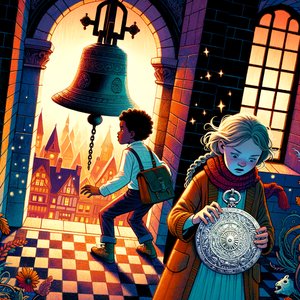The Bell That Listens

By the time the bunting went up in Emberbank’s square, the old clock tower had been quiet for exactly three weeks. No chime at noon. No gentle toll at sunset. Just the bones of the tower standing against the sky like a hand with its fingers curled, pretending not to tremble.
June Reyes stood at the base of the tower, the cobblestones warm through her sneakers, and held onto the pendant her grandmother had left her. It was shaped like a key, notched and strange, with a tiny bell carved into its handle and a thread of yellow ribbon tied to the loop. The metal was cool in the shade, and then warmer when June’s fingers grew tight around it, like the pendant was paying attention to her mood.
Around her, Emberbank hummed with its usual pre-festival flutter. The bakery windows breathed out vanilla and cinnamon. Stalls went up along the river, their striped awnings flapping like cheerful fish. Someone practised the parade drums in short, nervous bursts that made June’s chest jump in time. The river itself kept sliding past the town as if nothing had changed, even though everyone was talking about how quiet the tower had gone.
It wasn’t that people needed the tower’s voice to tell the time; there were phones for that, and wrists. It was more like everyone’s breath had gone out of step without it. June felt it most after school, when she crossed the square and didn’t feel the soft, steady hum of the bell in the air. When the bell was alive, it used to catch her feelings and hold them for a second, like cupping a firefly. She had told this to exactly one person: Lita Alma, her grandmother, who had laughed and said, ‘The bell listens more than it speaks. It hears what you can’t say yet, Juniper.’
But Lita Alma’s hands were no longer turning the cinnamon sugar in the bowl or folding tiny paper boats to float on the river. Three weeks ago, even before the tower fell silent, her grandmother’s heart had stopped while she slept, and June’s had gone on beating as usual, loud and guilty and stubborn. She hadn’t cried at the altar with the candles and the bowl of marigolds. She had felt full and hollow at once, like a drum.
At the memorial, her mother pressed the pendant into June’s palm. ‘She left this for you,’ she whispered. ‘There was a note.’
The note had been simple in Lita Alma’s swirly handwriting: For when the town is too loud or too quiet. For when your heart needs somewhere to go. The key knows the way.
June rubbed her thumb along the notch of the key now, listening to the square. Her best friend, Malik, zipped between two stalls carrying a tangle of coloured wires like a magician with a very uncooperative scarf. He slid on the last step of the fountain, stopped himself, and grinned at June like he meant to do that all along.
‘You’re doing your statue face,’ he said, panting. ‘Again.’
‘Am not,’ June said, and realised too late that her chin was up and her mouth was pinched like the clock tower’s stone men who never smiled.
‘It’s okay. You have a good statue face. Very tragic. Very dramatic. What’s the plan?’ Malik tucked the wires into his backpack and leaned close. ‘You brought it?’
June lifted the pendant. It flashed, just a quick wink, when a sunbeam escaped from a cloud.
‘Okay,’ he said, his voice softening. ‘We’re really doing this.’
June looked up. The tower door—tall, arched, and carved with a tangle of vines and stars—had been locked since the first day it went quiet. A sign read Maintenance in neat, important letters. But the locked door had never stopped Malik’s curiosity. He had a way with objects, a gentle, patient way of listening that made stuck zips slide and stubborn jars sigh open. And June… June had a way with the spaces between things. The parts you could feel, but not necessarily touch.
‘Just to look,’ she said, though her heart vaulted. ‘We’ll be quick.’
‘Just to look,’ Malik echoed. ‘And to possibly use your magical heirloom if it happens to want to unlock anything in our path.’
‘It’s not… it’s not magical.’ June pressed her lips together. ‘It’s Lita’s. That’s different.’
‘It’s both,’ Malik said, gentle. He had been the only one who didn’t tell June to cry when she couldn’t. He had stood beside her on the riverbank and skipped stones without talking, counting each skip under his breath like a blessing.
They waited for the parade drummers to turn the corner and the bunting to sigh in a gust of louder wind. Then they sidled to the door, and June’s pendant warmed against her palm like it had caught a secret.
The key’s metal kissed the carved star at eye level. There was a click—not the clunk of a lock, but the sound of something that had been holding its breath deciding not to anymore. The sign that said Maintenance fluttered forward and slid down the door like it had been attached by hope alone. June and Malik looked at each other, eyes wide, and then June pushed.
The air inside was cooler, dust-sweet, the kind of quiet that wasn’t empty but full of waiting things. The walls were curved stone. A row of pigeon feathers lay along the first steps, grey as old rain. Somewhere above, a plank creaked and then settled, like the tower had turned in its sleep.
June stepped inside, and the door swung shut, and for a moment the only sound was the quick beat of her heart. Which, when she paid attention, seemed to be answering a quieter rhythm that she couldn’t quite locate. Not a clock’s tick, exactly. More like the pause before a word.
‘Wow,’ Malik breathed, not even pretending to hide his grin now. He clicked on a small torch and sent a slow circle of light up the stairs that spiralled into the dim. ‘Do you feel that?’
‘It’s… hushy,’ June said. The word popped out of her mouth before she could find something less odd. ‘Like the room is telling us to be gentle.’
Malik nodded. ‘Then let’s be gentle.’ He stuck a hand out, and June felt a fizz of relief when she took it.
They climbed. The stone steps were worn in the middle where generations of feet had made a shallow dip. Every so often they passed a small window shaped like a teardrop, letting in slices of the square outside—the surge and slump of crowd noise, the shiny backs of fish-shaped kites bobbing, the river glancing sunlight back at the sky.
As they rose, June felt the air change around them. Not getting thinner, exactly—she wasn’t panting—but thicker with something like… attention. She thought about Lita Alma, about the way her grandmother used to say, ‘Names are important,’ and when she reached the first landing she saw a brass plate bolted to the wall. It read: Speak true. Step light. Keep time with your heart.
Malik touched the plate with one finger. ‘Creepy,’ he decided, although his voice held a thread of admiration. ‘Also cool.’
June’s pendant warmed so suddenly she almost dropped it. She let go of Malik’s hand long enough to hold the key up to the plate. Nothing moved, but the warmth softened and then cooled again, like someone saying, that’s right, you found it.
‘What if it wants to go higher?’ Malik said. ‘It is a bell key, right? Bells like height.’
‘Maybe it’s not a bell key,’ June said. ‘Maybe it’s… for the part of the bell that listens.’
They climbed again. Once, a pigeon exploded out of a window right as they passed it, and June yelped and grabbed Malik’s sleeve. He laughed, then apologised for laughing, even though she was already laughing with him, the fear dissolving into the kind that keeps you awake and makes everything feel brighter. The hush in the tower deepened and wore their laughter gently, like cloth.
At the second landing, another brass plate: Perhaps you have brought more than your feet. June thought of the way her guilt had sat at the bottom of her ribs like a stone for weeks and tried to think of something else. Malik, not reading the plate aloud, said, almost casually, ‘Are you okay?’
June nodded too quickly. ‘I will be,’ she said, and heard how it sounded like a promise she didn’t know how to keep.
At the third landing, a door waited. It was narrower and less grand than the one at the bottom, made of wood gone silvery with time. In its centre was a keyhole the exact shape of June’s pendant. She didn’t even have to hold the pendant up; it swung forward on its ribbon like a compass needle finding north.
June’s mouth went dry. She could feel Malik’s gaze on her cheek, warm as the sun through those teardrop windows. She slid the pendant into the keyhole.
Something inside the door woke up. June felt it more than heard it: a set of gears aligning, a sigh moving along hidden channels, the way a hush changes when a secret is about to be told. The door swung inward, and cool air stroked their faces, carrying the smell of iron and dust and rain that hadn’t fallen yet.
The room beyond was round. Its ceiling arched up into shadows where the bell itself slept, and its floor was a mosaic of tiny, dark tiles in looping patterns that made June’s eyes follow them in circles without meaning to. In the centre, a wooden frame held a rope the colour of storm-clouds. The rope wasn’t simple; it was braided out of strands of something that glittered softly when she moved—metal? Hair? Thread? June didn’t know, but when she stepped closer, her pendant hummed in sympathy.
‘Whoa,’ Malik whispered. He turned in a slow circle, his torch beam skating across a row of peculiar machines around the perimeter—levers with carved handles, pulleys with feathers tied to them, small boxes with shutters that changed colour when his light brushed them. On one shelf sat a glass lantern with no flame inside, only a pale glow like the inside of a seashell at dusk.
June reached for the rope and then stopped with her hand still hovering. On the far wall, another brass plate shone: Emotions are weights. Lift with care.
‘It listens,’ June said. ‘It really does.’ Her voice finally sounded like hers and not someone pretending to be fine. It made her throat ache.
Malik came to stand beside her. ‘What if it needs you to talk to it,’ he said, ‘to figure out how to be itself again?’
June thought of the square outside, the festival tomorrow, the way people kept glancing at the tower as if it had let them down. She thought of Lita Alma’s hands rolling dough and her laugh folding around June like a blanket. She thought of the way she had not cried, because she was afraid that if she started she would fall apart and never be able to put her pieces back.
She wrapped her fingers around the rope.
It wasn’t rough like she expected. It warmed under her touch, and the warmth ran up her arms to her chest and then uncurled there, making room. The rope gave, just a little, like the inhale before you speak. The lantern on the shelf brightened. The mosaic under her feet seemed to tilt toward her, then away.
‘June?’ Malik said, very softly. He had one hand out, like he was ready to catch her or the rope or both. His other hand hovered near a lever carved with an oak leaf, as if it might be good to be ready for more than one thing.
June closed her eyes. She let one thing rise, just one, and it wasn’t guilt or fear, not exactly. It was the memory of her grandmother’s voice saying her name in the kitchen, June-June-June, the way a favourite song says your name. She let it build like the river before the bridge. When she tugged on the rope, the whole tower took a breath.
The air changed. The glow in the lantern bloomed, and a second light woke in the corner of the room, as if something had answered, Yes, I hear you. Somewhere above, metal shifted with a tender, enormous sound. June felt her heartbeat line up with it, not matching perfectly, but trying.
Then a new sound entered the room—not from above, not the promise of a chime, but a voice, close and urgent, from the darkness at the top of the stairs.
‘Don’t let it ring,’ the voice said, low and fierce. ‘Not yet.’
June’s fingers tightened around the rope as a shadow separated from the stairwell and began to move towards them, and the lantern flared bright enough to make both of their hearts leap.
Autor zakończenia:

 English
English
 polski
polski
 Co było dalej?
Co było dalej?



